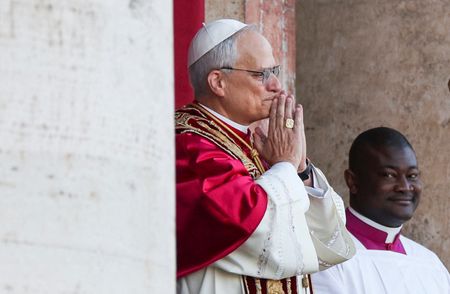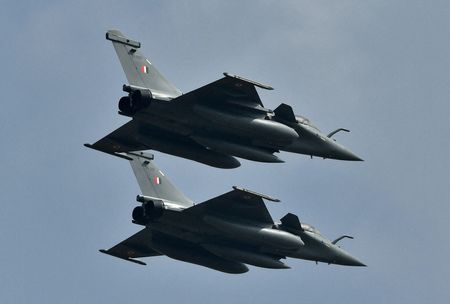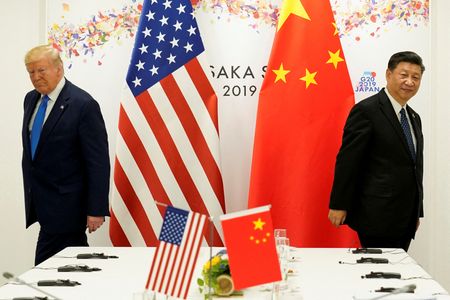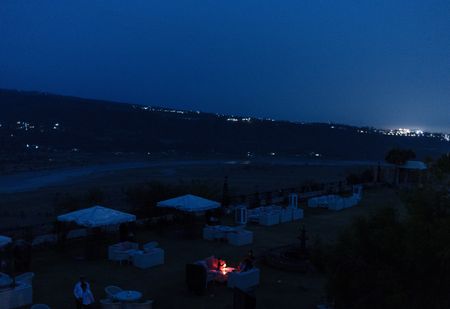By Pesha Magid, Maha El Dahan and Manya Saini
RIYADH/DUBAI (Reuters) – Saudi Arabia has held off formally joining the BRICS bloc of nations despite attending a meeting in Brazil last week, two sources said, finessing an issue that could upset Washington as Riyadh seeks to seal deals with its U.S. ally.
The issue of BRICS membership has been diplomatically sensitive for Saudi Arabia since it was first invited to join in 2023, and remains so with President Donald Trump due to visit next week and Riyadh negotiating nuclear and technology deals.
BRICS, founded as a grouping of Brazil, Russia, India, China and South Africa to counter Western dominance of the world order, has grown in recent years to include emerging economies such as the United Arab Emirates, Egypt and Indonesia.
But while the BRICS website shows Saudi Arabia – the world’s largest oil exporter – as a member, it has yet to join, according to the two sources, both with direct knowledge of Saudi policy.
Saudi Arabia’s government communications office did not immediately respond to a request for comment.
Brazil’s foreign ministry referred Reuters to the Saudi government when asked about the kingdom’s listed status as a member on the website. Brazil is currently presiding over BRICS.
Riyadh does not want to risk U.S. anger as negotiations are underway with Washington, one of the sources and a diplomat said.
Saudi Arabia sent its deputy foreign minister to the April 29 meeting in Rio de Janeiro, where ministers from the fast-expanding bloc failed to agree a joint communique.
The kingdom’s ambivalence about BRICS membership lays bare its high-stakes balancing act between China, its biggest oil export customer, and Washington, its indispensable security and technology partner – a tightrope walk made ever more precarious by the deepening U.S.-Chinese divide.
“The Saudis still see tons of value in engaging with BRICS and its member states. They will keep double-dipping – or multi-dipping – with global partnerships as long as they can,” said Robert Mogielnicki, senior resident scholar at the Arab Gulf States Institute in Washington.
“I think the Saudi calculation is that what they may be able to get out of the U.S. outweighs what they could get from BRICS membership, at least over the short term.”
In January, Trump demanded that BRICS commit to not creating a new currency or supporting another currency that would replace the U.S. dollar, or face 100% tariffs against BRICS nations.
SEEKING ALLIES
While the kingdom still favors its historic ally the United States, it is also seeking to nurture trade ties with China, the largest importer of Saudi crude.
In February, Saudi Arabia exported goods worth 15.2 billion riyals ($4.05 billion) to China, marking a 20.6% increase from a year earlier, when trade amounted to 12.6 billion riyals, data from the Observatory of Economic Complexity show. Over the past five years, trade has grown at an annualised rate of 50.3%.
Total Chinese investment and construction contracts in Saudi Arabia between 2005 and mid-2024 reached nearly $71 billion, according to the China Global Investment Tracker, reflecting Beijing’s growing role in the kingdom’s economic transformation.
The Saudi partnership with the United States remains central to its security, investment and technology ambitions, even as it expands relations with rival powers like China and Russia.
The U.S. is poised to offer Saudi Arabia an arms package worth well over $100 billion, sources told Reuters last month, saying the proposal was being lined up for announcement during Trump’s visit.
BRICS has sought to shift away from the dollar into other currencies. But a study by the Atlantic Council’s GeoEconomics Center last year showed the greenback remains the world’s primary reserve currency, and neither the euro nor the BRICS countries have managed to reduce global reliance on the dollar.
“While BRICS is a useful forum for airing grievances over American behaviour, it is not yet a body coherent enough to provide public goods on key issues like currency cooperation, security, or economic integration,” said Steffen Hertog, associate professor in comparative politics at the London School of Economics.
“Saudi feels like they have the leverage and they are enjoying the position,” said Saudi analyst Aziz Alghashian.
“They see it that the United States is still the main actor, but there are others that could also provide utility,” he added.
($1 = 3.7509 riyals)
(Reporting by Pesha Magid in Riyad, Maha El Dahan and Manya Saini in Dubai; additional reporting by Lisandra Paraguassu in Brasilia; editing by Tom Perry and Mark Heinrich)










